Individual Research Proposal: Ecotourism and Hospitality Impact
VerifiedAdded on 2023/01/11
|8
|2073
|22
Project
AI Summary
This research proposal investigates the impact of ecotourism practices on the profitability of hospitality organizations, with a specific focus on Marriott Hotel. The proposal includes an introduction to ecotourism, research aims and objectives, and a preliminary literature review that explores the evolution of ecotourism, its effects on profitability, and associated challenges. The proposed research methodology outlines a qualitative research approach, employing interpretivism, and utilizing both primary and secondary data collection methods, including questionnaires and literature review techniques. The anticipated results aim to assess how ecotourism decisions affect profitability, identify measures to control costs, and highlight challenges, ultimately providing recommendations for hospitality organizations. The proposal concludes with a summary of the research plan and anticipated outcomes, emphasizing the potential to generalize findings to other hotels with similar operational structures.
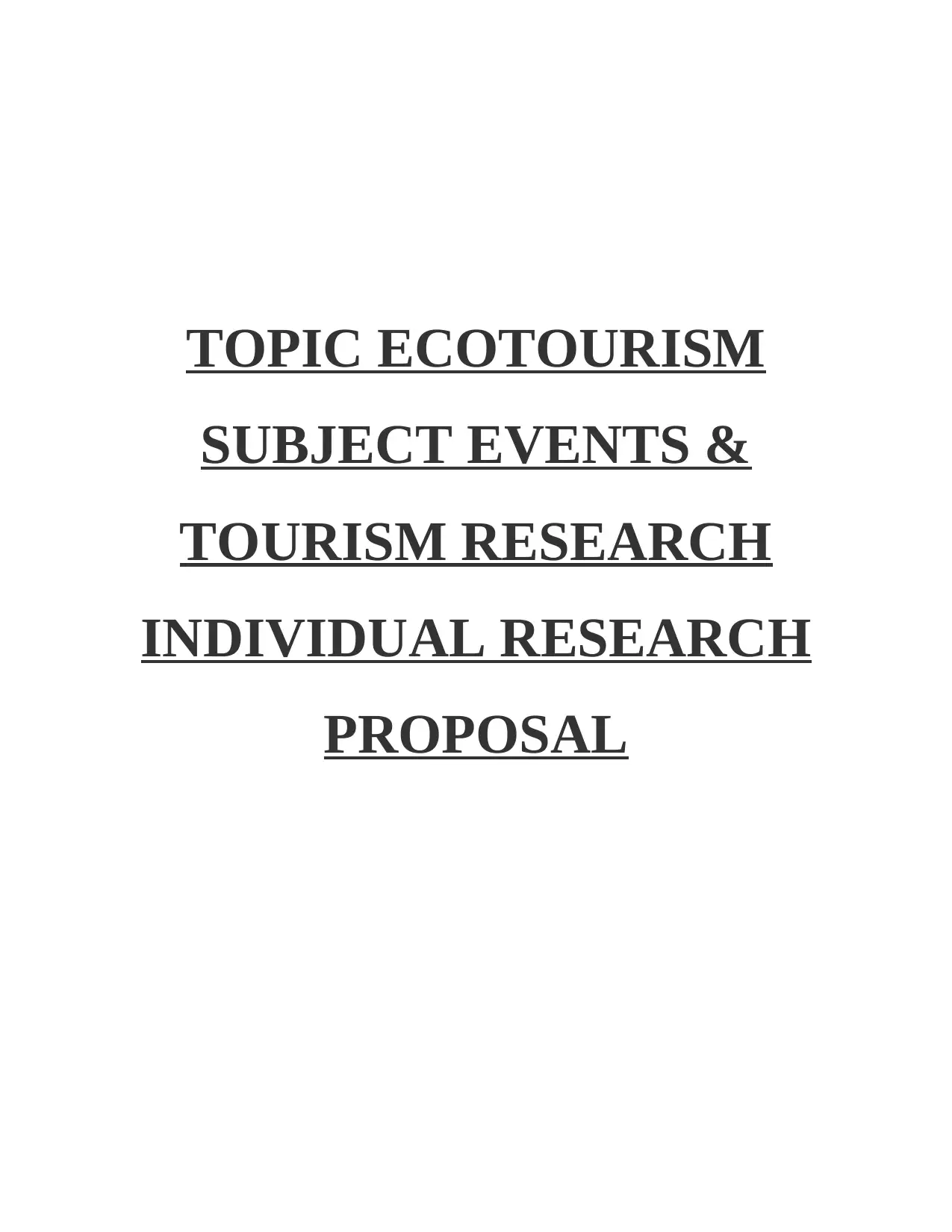
TOPIC ECOTOURISM
SUBJECT EVENTS &
TOURISM RESEARCH
INDIVIDUAL RESEARCH
PROPOSAL
SUBJECT EVENTS &
TOURISM RESEARCH
INDIVIDUAL RESEARCH
PROPOSAL
Paraphrase This Document
Need a fresh take? Get an instant paraphrase of this document with our AI Paraphraser
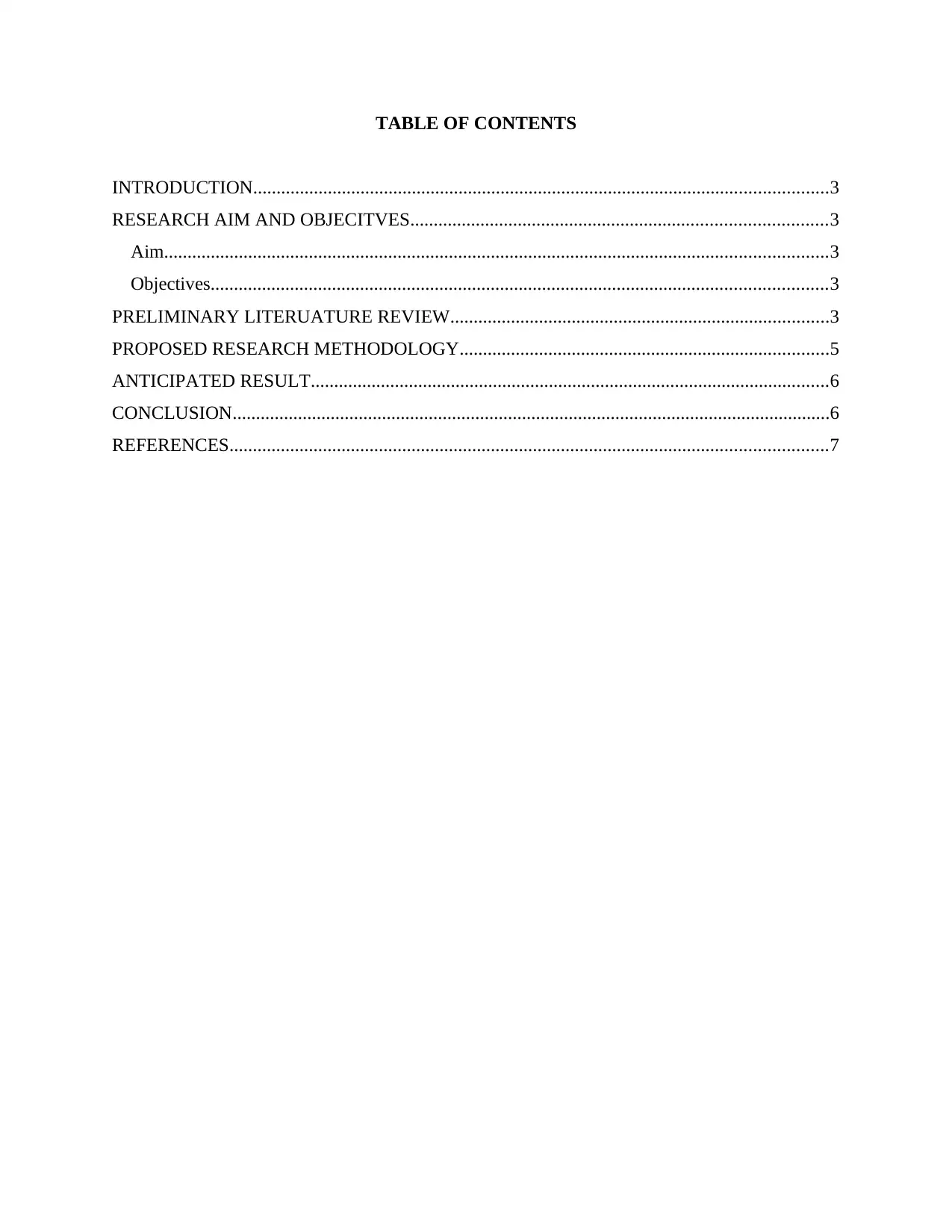
TABLE OF CONTENTS
INTRODUCTION...........................................................................................................................3
RESEARCH AIM AND OBJECITVES.........................................................................................3
Aim..............................................................................................................................................3
Objectives....................................................................................................................................3
PRELIMINARY LITERUATURE REVIEW.................................................................................3
PROPOSED RESEARCH METHODOLOGY...............................................................................5
ANTICIPATED RESULT...............................................................................................................6
CONCLUSION................................................................................................................................6
REFERENCES................................................................................................................................7
INTRODUCTION...........................................................................................................................3
RESEARCH AIM AND OBJECITVES.........................................................................................3
Aim..............................................................................................................................................3
Objectives....................................................................................................................................3
PRELIMINARY LITERUATURE REVIEW.................................................................................3
PROPOSED RESEARCH METHODOLOGY...............................................................................5
ANTICIPATED RESULT...............................................................................................................6
CONCLUSION................................................................................................................................6
REFERENCES................................................................................................................................7
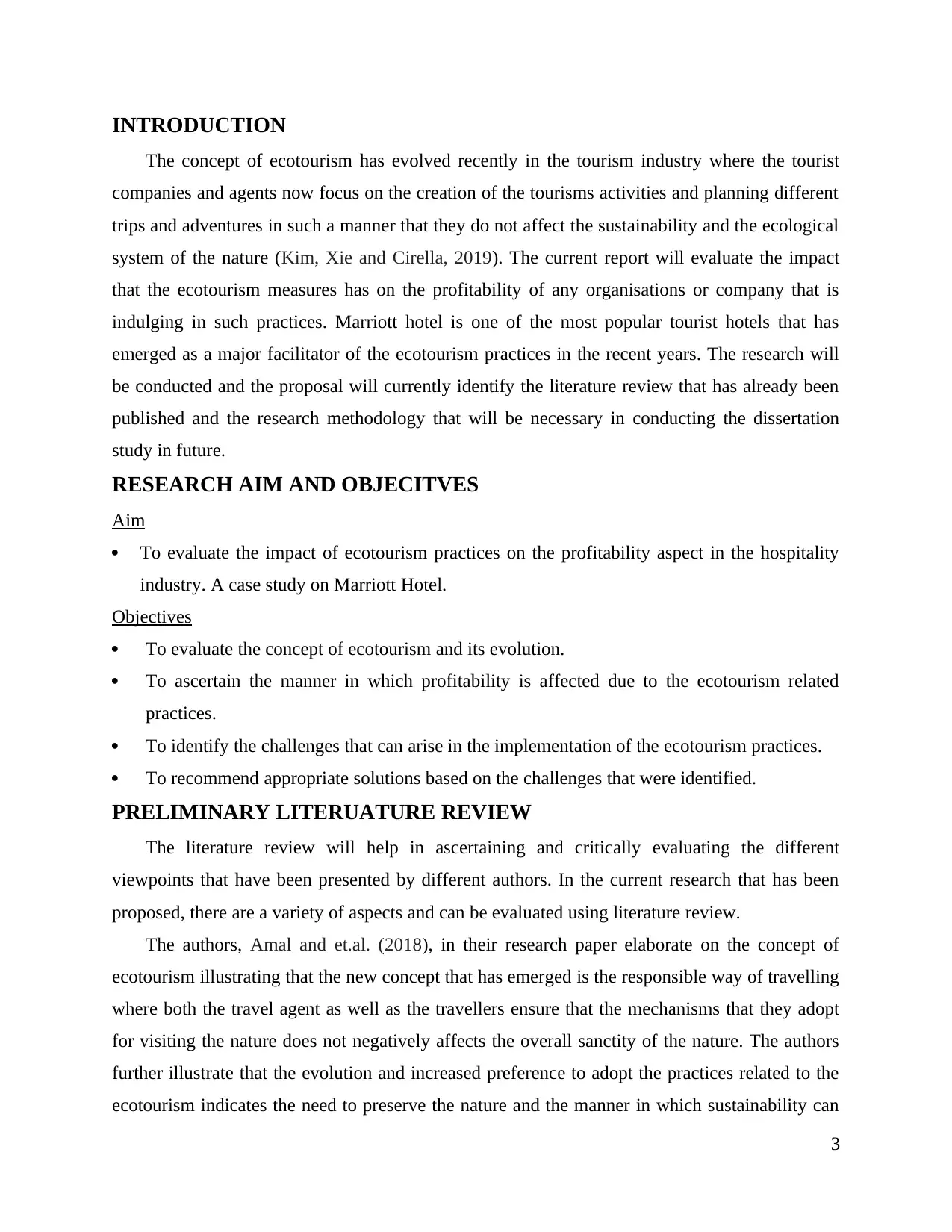
INTRODUCTION
The concept of ecotourism has evolved recently in the tourism industry where the tourist
companies and agents now focus on the creation of the tourisms activities and planning different
trips and adventures in such a manner that they do not affect the sustainability and the ecological
system of the nature (Kim, Xie and Cirella, 2019). The current report will evaluate the impact
that the ecotourism measures has on the profitability of any organisations or company that is
indulging in such practices. Marriott hotel is one of the most popular tourist hotels that has
emerged as a major facilitator of the ecotourism practices in the recent years. The research will
be conducted and the proposal will currently identify the literature review that has already been
published and the research methodology that will be necessary in conducting the dissertation
study in future.
RESEARCH AIM AND OBJECITVES
Aim
To evaluate the impact of ecotourism practices on the profitability aspect in the hospitality
industry. A case study on Marriott Hotel.
Objectives
To evaluate the concept of ecotourism and its evolution.
To ascertain the manner in which profitability is affected due to the ecotourism related
practices.
To identify the challenges that can arise in the implementation of the ecotourism practices.
To recommend appropriate solutions based on the challenges that were identified.
PRELIMINARY LITERUATURE REVIEW
The literature review will help in ascertaining and critically evaluating the different
viewpoints that have been presented by different authors. In the current research that has been
proposed, there are a variety of aspects and can be evaluated using literature review.
The authors, Amal and et.al. (2018), in their research paper elaborate on the concept of
ecotourism illustrating that the new concept that has emerged is the responsible way of travelling
where both the travel agent as well as the travellers ensure that the mechanisms that they adopt
for visiting the nature does not negatively affects the overall sanctity of the nature. The authors
further illustrate that the evolution and increased preference to adopt the practices related to the
ecotourism indicates the need to preserve the nature and the manner in which sustainability can
3
The concept of ecotourism has evolved recently in the tourism industry where the tourist
companies and agents now focus on the creation of the tourisms activities and planning different
trips and adventures in such a manner that they do not affect the sustainability and the ecological
system of the nature (Kim, Xie and Cirella, 2019). The current report will evaluate the impact
that the ecotourism measures has on the profitability of any organisations or company that is
indulging in such practices. Marriott hotel is one of the most popular tourist hotels that has
emerged as a major facilitator of the ecotourism practices in the recent years. The research will
be conducted and the proposal will currently identify the literature review that has already been
published and the research methodology that will be necessary in conducting the dissertation
study in future.
RESEARCH AIM AND OBJECITVES
Aim
To evaluate the impact of ecotourism practices on the profitability aspect in the hospitality
industry. A case study on Marriott Hotel.
Objectives
To evaluate the concept of ecotourism and its evolution.
To ascertain the manner in which profitability is affected due to the ecotourism related
practices.
To identify the challenges that can arise in the implementation of the ecotourism practices.
To recommend appropriate solutions based on the challenges that were identified.
PRELIMINARY LITERUATURE REVIEW
The literature review will help in ascertaining and critically evaluating the different
viewpoints that have been presented by different authors. In the current research that has been
proposed, there are a variety of aspects and can be evaluated using literature review.
The authors, Amal and et.al. (2018), in their research paper elaborate on the concept of
ecotourism illustrating that the new concept that has emerged is the responsible way of travelling
where both the travel agent as well as the travellers ensure that the mechanisms that they adopt
for visiting the nature does not negatively affects the overall sanctity of the nature. The authors
further illustrate that the evolution and increased preference to adopt the practices related to the
ecotourism indicates the need to preserve the nature and the manner in which sustainability can
3
⊘ This is a preview!⊘
Do you want full access?
Subscribe today to unlock all pages.

Trusted by 1+ million students worldwide
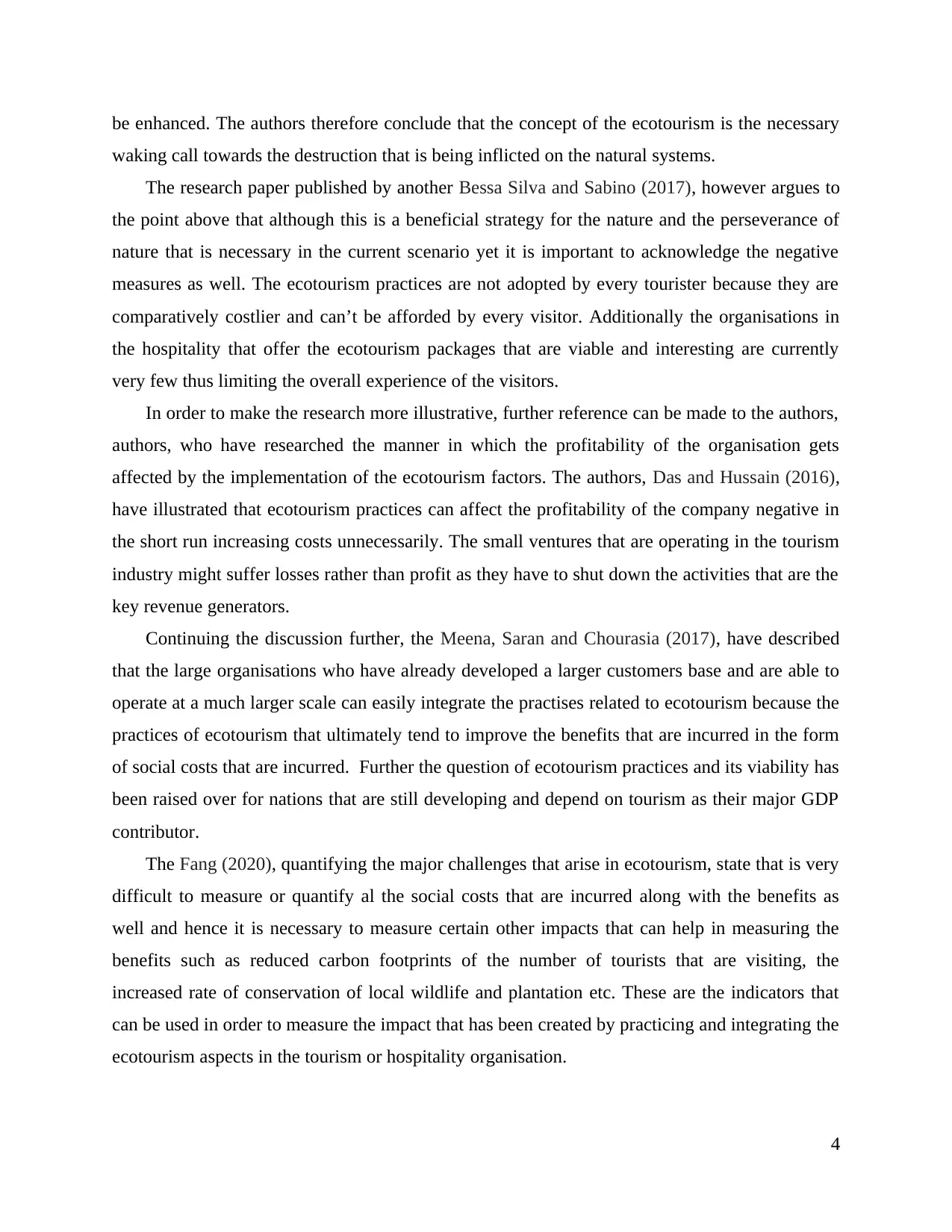
be enhanced. The authors therefore conclude that the concept of the ecotourism is the necessary
waking call towards the destruction that is being inflicted on the natural systems.
The research paper published by another Bessa Silva and Sabino (2017), however argues to
the point above that although this is a beneficial strategy for the nature and the perseverance of
nature that is necessary in the current scenario yet it is important to acknowledge the negative
measures as well. The ecotourism practices are not adopted by every tourister because they are
comparatively costlier and can’t be afforded by every visitor. Additionally the organisations in
the hospitality that offer the ecotourism packages that are viable and interesting are currently
very few thus limiting the overall experience of the visitors.
In order to make the research more illustrative, further reference can be made to the authors,
authors, who have researched the manner in which the profitability of the organisation gets
affected by the implementation of the ecotourism factors. The authors, Das and Hussain (2016),
have illustrated that ecotourism practices can affect the profitability of the company negative in
the short run increasing costs unnecessarily. The small ventures that are operating in the tourism
industry might suffer losses rather than profit as they have to shut down the activities that are the
key revenue generators.
Continuing the discussion further, the Meena, Saran and Chourasia (2017), have described
that the large organisations who have already developed a larger customers base and are able to
operate at a much larger scale can easily integrate the practises related to ecotourism because the
practices of ecotourism that ultimately tend to improve the benefits that are incurred in the form
of social costs that are incurred. Further the question of ecotourism practices and its viability has
been raised over for nations that are still developing and depend on tourism as their major GDP
contributor.
The Fang (2020), quantifying the major challenges that arise in ecotourism, state that is very
difficult to measure or quantify al the social costs that are incurred along with the benefits as
well and hence it is necessary to measure certain other impacts that can help in measuring the
benefits such as reduced carbon footprints of the number of tourists that are visiting, the
increased rate of conservation of local wildlife and plantation etc. These are the indicators that
can be used in order to measure the impact that has been created by practicing and integrating the
ecotourism aspects in the tourism or hospitality organisation.
4
waking call towards the destruction that is being inflicted on the natural systems.
The research paper published by another Bessa Silva and Sabino (2017), however argues to
the point above that although this is a beneficial strategy for the nature and the perseverance of
nature that is necessary in the current scenario yet it is important to acknowledge the negative
measures as well. The ecotourism practices are not adopted by every tourister because they are
comparatively costlier and can’t be afforded by every visitor. Additionally the organisations in
the hospitality that offer the ecotourism packages that are viable and interesting are currently
very few thus limiting the overall experience of the visitors.
In order to make the research more illustrative, further reference can be made to the authors,
authors, who have researched the manner in which the profitability of the organisation gets
affected by the implementation of the ecotourism factors. The authors, Das and Hussain (2016),
have illustrated that ecotourism practices can affect the profitability of the company negative in
the short run increasing costs unnecessarily. The small ventures that are operating in the tourism
industry might suffer losses rather than profit as they have to shut down the activities that are the
key revenue generators.
Continuing the discussion further, the Meena, Saran and Chourasia (2017), have described
that the large organisations who have already developed a larger customers base and are able to
operate at a much larger scale can easily integrate the practises related to ecotourism because the
practices of ecotourism that ultimately tend to improve the benefits that are incurred in the form
of social costs that are incurred. Further the question of ecotourism practices and its viability has
been raised over for nations that are still developing and depend on tourism as their major GDP
contributor.
The Fang (2020), quantifying the major challenges that arise in ecotourism, state that is very
difficult to measure or quantify al the social costs that are incurred along with the benefits as
well and hence it is necessary to measure certain other impacts that can help in measuring the
benefits such as reduced carbon footprints of the number of tourists that are visiting, the
increased rate of conservation of local wildlife and plantation etc. These are the indicators that
can be used in order to measure the impact that has been created by practicing and integrating the
ecotourism aspects in the tourism or hospitality organisation.
4
Paraphrase This Document
Need a fresh take? Get an instant paraphrase of this document with our AI Paraphraser
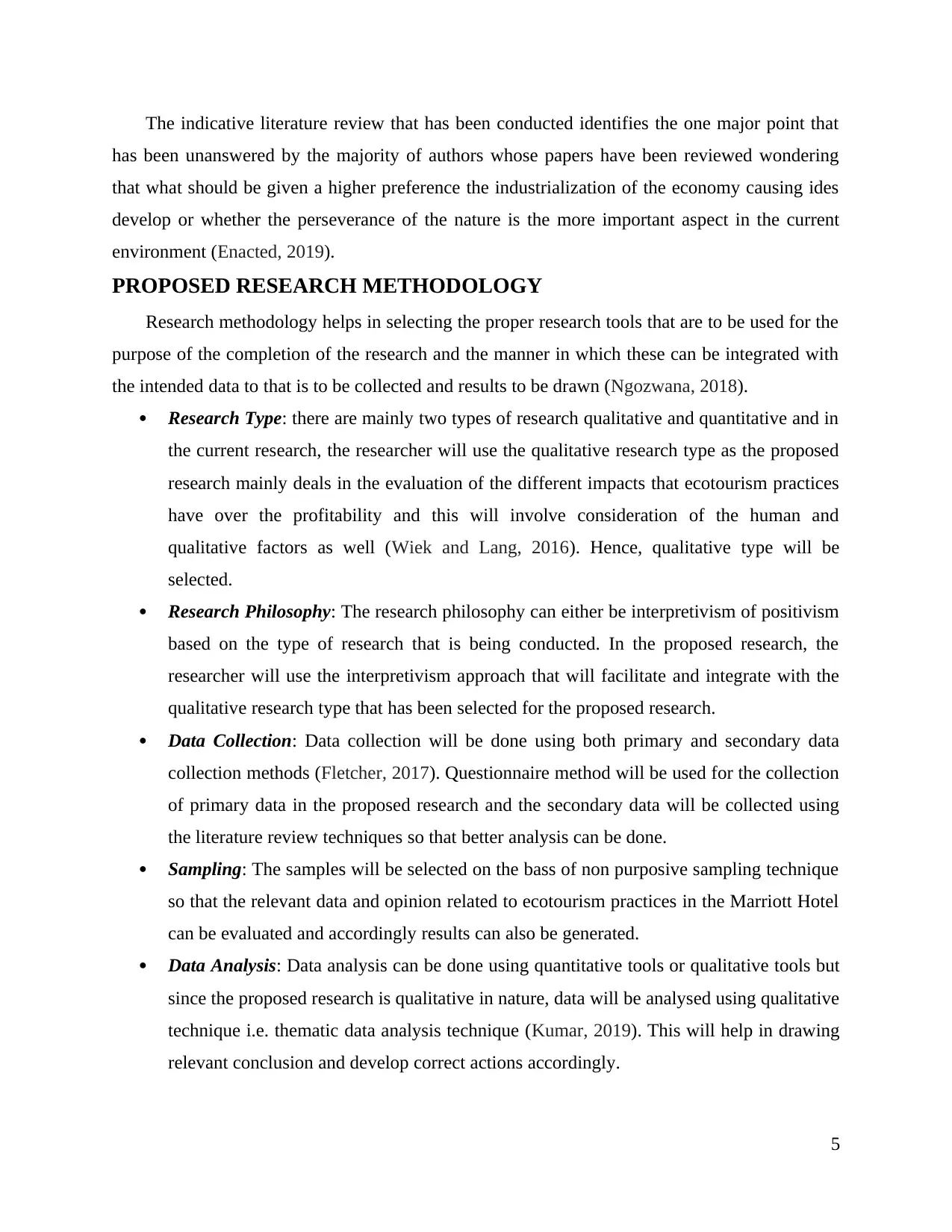
The indicative literature review that has been conducted identifies the one major point that
has been unanswered by the majority of authors whose papers have been reviewed wondering
that what should be given a higher preference the industrialization of the economy causing ides
develop or whether the perseverance of the nature is the more important aspect in the current
environment (Enacted, 2019).
PROPOSED RESEARCH METHODOLOGY
Research methodology helps in selecting the proper research tools that are to be used for the
purpose of the completion of the research and the manner in which these can be integrated with
the intended data to that is to be collected and results to be drawn (Ngozwana, 2018).
Research Type: there are mainly two types of research qualitative and quantitative and in
the current research, the researcher will use the qualitative research type as the proposed
research mainly deals in the evaluation of the different impacts that ecotourism practices
have over the profitability and this will involve consideration of the human and
qualitative factors as well (Wiek and Lang, 2016). Hence, qualitative type will be
selected.
Research Philosophy: The research philosophy can either be interpretivism of positivism
based on the type of research that is being conducted. In the proposed research, the
researcher will use the interpretivism approach that will facilitate and integrate with the
qualitative research type that has been selected for the proposed research.
Data Collection: Data collection will be done using both primary and secondary data
collection methods (Fletcher, 2017). Questionnaire method will be used for the collection
of primary data in the proposed research and the secondary data will be collected using
the literature review techniques so that better analysis can be done.
Sampling: The samples will be selected on the bass of non purposive sampling technique
so that the relevant data and opinion related to ecotourism practices in the Marriott Hotel
can be evaluated and accordingly results can also be generated.
Data Analysis: Data analysis can be done using quantitative tools or qualitative tools but
since the proposed research is qualitative in nature, data will be analysed using qualitative
technique i.e. thematic data analysis technique (Kumar, 2019). This will help in drawing
relevant conclusion and develop correct actions accordingly.
5
has been unanswered by the majority of authors whose papers have been reviewed wondering
that what should be given a higher preference the industrialization of the economy causing ides
develop or whether the perseverance of the nature is the more important aspect in the current
environment (Enacted, 2019).
PROPOSED RESEARCH METHODOLOGY
Research methodology helps in selecting the proper research tools that are to be used for the
purpose of the completion of the research and the manner in which these can be integrated with
the intended data to that is to be collected and results to be drawn (Ngozwana, 2018).
Research Type: there are mainly two types of research qualitative and quantitative and in
the current research, the researcher will use the qualitative research type as the proposed
research mainly deals in the evaluation of the different impacts that ecotourism practices
have over the profitability and this will involve consideration of the human and
qualitative factors as well (Wiek and Lang, 2016). Hence, qualitative type will be
selected.
Research Philosophy: The research philosophy can either be interpretivism of positivism
based on the type of research that is being conducted. In the proposed research, the
researcher will use the interpretivism approach that will facilitate and integrate with the
qualitative research type that has been selected for the proposed research.
Data Collection: Data collection will be done using both primary and secondary data
collection methods (Fletcher, 2017). Questionnaire method will be used for the collection
of primary data in the proposed research and the secondary data will be collected using
the literature review techniques so that better analysis can be done.
Sampling: The samples will be selected on the bass of non purposive sampling technique
so that the relevant data and opinion related to ecotourism practices in the Marriott Hotel
can be evaluated and accordingly results can also be generated.
Data Analysis: Data analysis can be done using quantitative tools or qualitative tools but
since the proposed research is qualitative in nature, data will be analysed using qualitative
technique i.e. thematic data analysis technique (Kumar, 2019). This will help in drawing
relevant conclusion and develop correct actions accordingly.
5
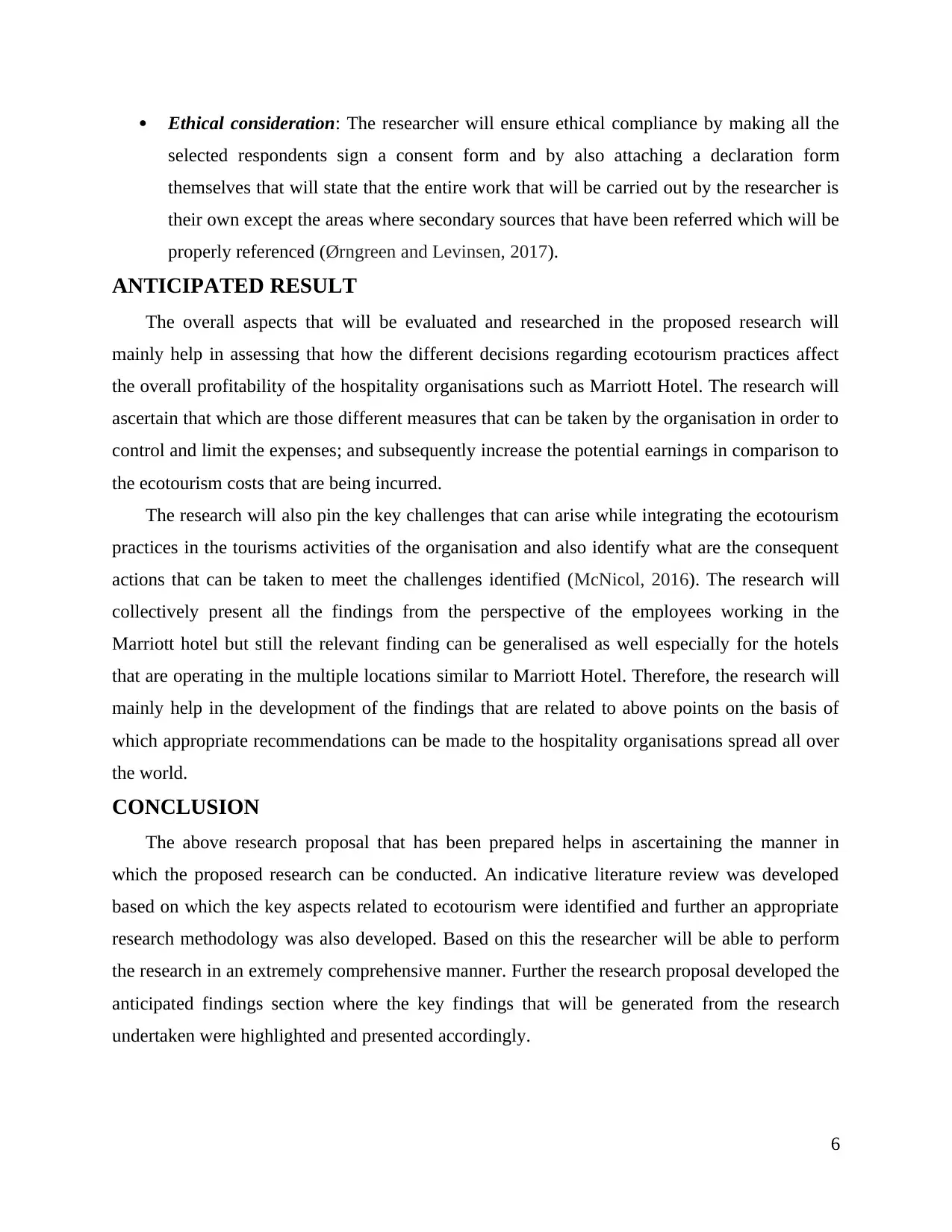
Ethical consideration: The researcher will ensure ethical compliance by making all the
selected respondents sign a consent form and by also attaching a declaration form
themselves that will state that the entire work that will be carried out by the researcher is
their own except the areas where secondary sources that have been referred which will be
properly referenced (Ørngreen and Levinsen, 2017).
ANTICIPATED RESULT
The overall aspects that will be evaluated and researched in the proposed research will
mainly help in assessing that how the different decisions regarding ecotourism practices affect
the overall profitability of the hospitality organisations such as Marriott Hotel. The research will
ascertain that which are those different measures that can be taken by the organisation in order to
control and limit the expenses; and subsequently increase the potential earnings in comparison to
the ecotourism costs that are being incurred.
The research will also pin the key challenges that can arise while integrating the ecotourism
practices in the tourisms activities of the organisation and also identify what are the consequent
actions that can be taken to meet the challenges identified (McNicol, 2016). The research will
collectively present all the findings from the perspective of the employees working in the
Marriott hotel but still the relevant finding can be generalised as well especially for the hotels
that are operating in the multiple locations similar to Marriott Hotel. Therefore, the research will
mainly help in the development of the findings that are related to above points on the basis of
which appropriate recommendations can be made to the hospitality organisations spread all over
the world.
CONCLUSION
The above research proposal that has been prepared helps in ascertaining the manner in
which the proposed research can be conducted. An indicative literature review was developed
based on which the key aspects related to ecotourism were identified and further an appropriate
research methodology was also developed. Based on this the researcher will be able to perform
the research in an extremely comprehensive manner. Further the research proposal developed the
anticipated findings section where the key findings that will be generated from the research
undertaken were highlighted and presented accordingly.
6
selected respondents sign a consent form and by also attaching a declaration form
themselves that will state that the entire work that will be carried out by the researcher is
their own except the areas where secondary sources that have been referred which will be
properly referenced (Ørngreen and Levinsen, 2017).
ANTICIPATED RESULT
The overall aspects that will be evaluated and researched in the proposed research will
mainly help in assessing that how the different decisions regarding ecotourism practices affect
the overall profitability of the hospitality organisations such as Marriott Hotel. The research will
ascertain that which are those different measures that can be taken by the organisation in order to
control and limit the expenses; and subsequently increase the potential earnings in comparison to
the ecotourism costs that are being incurred.
The research will also pin the key challenges that can arise while integrating the ecotourism
practices in the tourisms activities of the organisation and also identify what are the consequent
actions that can be taken to meet the challenges identified (McNicol, 2016). The research will
collectively present all the findings from the perspective of the employees working in the
Marriott hotel but still the relevant finding can be generalised as well especially for the hotels
that are operating in the multiple locations similar to Marriott Hotel. Therefore, the research will
mainly help in the development of the findings that are related to above points on the basis of
which appropriate recommendations can be made to the hospitality organisations spread all over
the world.
CONCLUSION
The above research proposal that has been prepared helps in ascertaining the manner in
which the proposed research can be conducted. An indicative literature review was developed
based on which the key aspects related to ecotourism were identified and further an appropriate
research methodology was also developed. Based on this the researcher will be able to perform
the research in an extremely comprehensive manner. Further the research proposal developed the
anticipated findings section where the key findings that will be generated from the research
undertaken were highlighted and presented accordingly.
6
⊘ This is a preview!⊘
Do you want full access?
Subscribe today to unlock all pages.

Trusted by 1+ million students worldwide
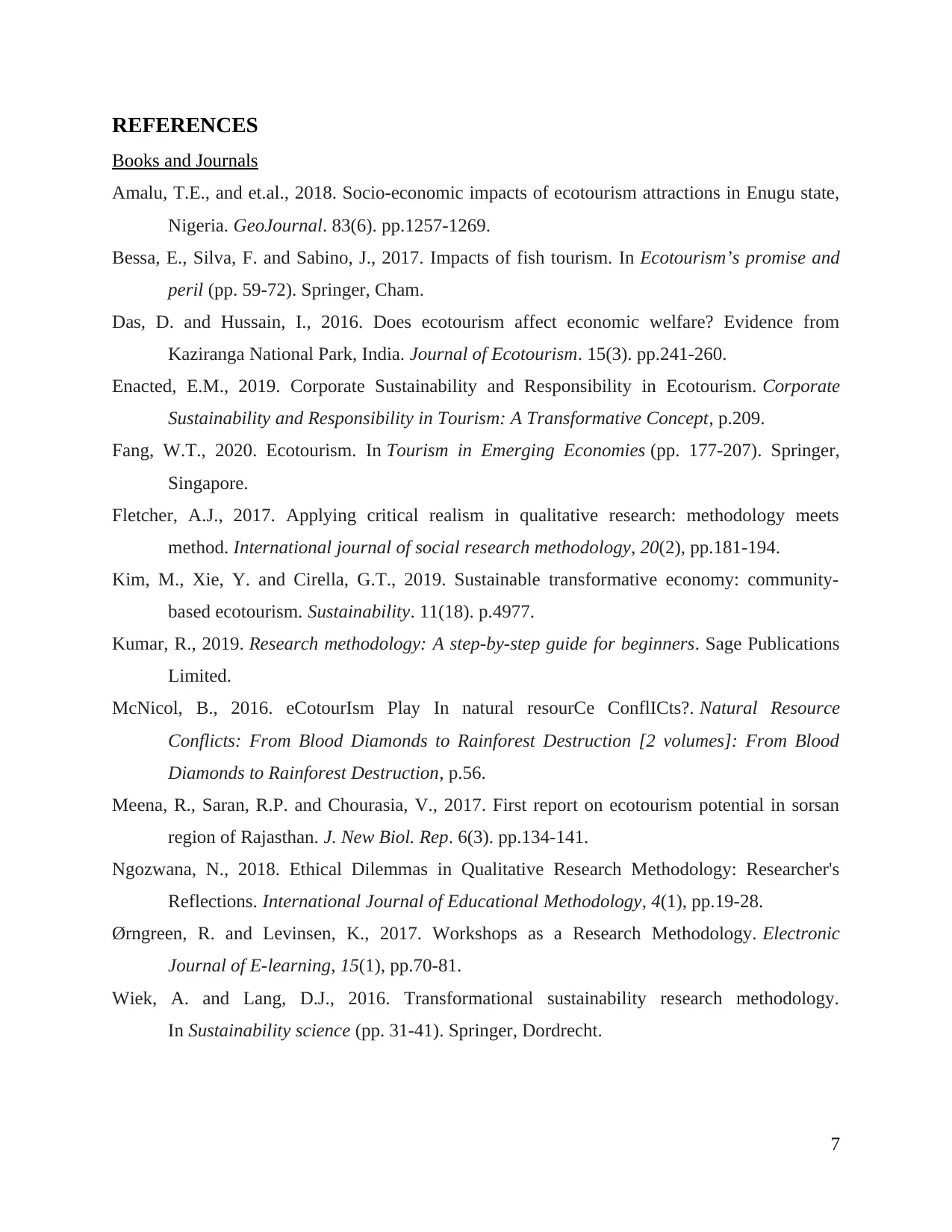
REFERENCES
Books and Journals
Amalu, T.E., and et.al., 2018. Socio-economic impacts of ecotourism attractions in Enugu state,
Nigeria. GeoJournal. 83(6). pp.1257-1269.
Bessa, E., Silva, F. and Sabino, J., 2017. Impacts of fish tourism. In Ecotourism’s promise and
peril (pp. 59-72). Springer, Cham.
Das, D. and Hussain, I., 2016. Does ecotourism affect economic welfare? Evidence from
Kaziranga National Park, India. Journal of Ecotourism. 15(3). pp.241-260.
Enacted, E.M., 2019. Corporate Sustainability and Responsibility in Ecotourism. Corporate
Sustainability and Responsibility in Tourism: A Transformative Concept, p.209.
Fang, W.T., 2020. Ecotourism. In Tourism in Emerging Economies (pp. 177-207). Springer,
Singapore.
Fletcher, A.J., 2017. Applying critical realism in qualitative research: methodology meets
method. International journal of social research methodology, 20(2), pp.181-194.
Kim, M., Xie, Y. and Cirella, G.T., 2019. Sustainable transformative economy: community-
based ecotourism. Sustainability. 11(18). p.4977.
Kumar, R., 2019. Research methodology: A step-by-step guide for beginners. Sage Publications
Limited.
McNicol, B., 2016. eCotourIsm Play In natural resourCe ConflICts?. Natural Resource
Conflicts: From Blood Diamonds to Rainforest Destruction [2 volumes]: From Blood
Diamonds to Rainforest Destruction, p.56.
Meena, R., Saran, R.P. and Chourasia, V., 2017. First report on ecotourism potential in sorsan
region of Rajasthan. J. New Biol. Rep. 6(3). pp.134-141.
Ngozwana, N., 2018. Ethical Dilemmas in Qualitative Research Methodology: Researcher's
Reflections. International Journal of Educational Methodology, 4(1), pp.19-28.
Ørngreen, R. and Levinsen, K., 2017. Workshops as a Research Methodology. Electronic
Journal of E-learning, 15(1), pp.70-81.
Wiek, A. and Lang, D.J., 2016. Transformational sustainability research methodology.
In Sustainability science (pp. 31-41). Springer, Dordrecht.
7
Books and Journals
Amalu, T.E., and et.al., 2018. Socio-economic impacts of ecotourism attractions in Enugu state,
Nigeria. GeoJournal. 83(6). pp.1257-1269.
Bessa, E., Silva, F. and Sabino, J., 2017. Impacts of fish tourism. In Ecotourism’s promise and
peril (pp. 59-72). Springer, Cham.
Das, D. and Hussain, I., 2016. Does ecotourism affect economic welfare? Evidence from
Kaziranga National Park, India. Journal of Ecotourism. 15(3). pp.241-260.
Enacted, E.M., 2019. Corporate Sustainability and Responsibility in Ecotourism. Corporate
Sustainability and Responsibility in Tourism: A Transformative Concept, p.209.
Fang, W.T., 2020. Ecotourism. In Tourism in Emerging Economies (pp. 177-207). Springer,
Singapore.
Fletcher, A.J., 2017. Applying critical realism in qualitative research: methodology meets
method. International journal of social research methodology, 20(2), pp.181-194.
Kim, M., Xie, Y. and Cirella, G.T., 2019. Sustainable transformative economy: community-
based ecotourism. Sustainability. 11(18). p.4977.
Kumar, R., 2019. Research methodology: A step-by-step guide for beginners. Sage Publications
Limited.
McNicol, B., 2016. eCotourIsm Play In natural resourCe ConflICts?. Natural Resource
Conflicts: From Blood Diamonds to Rainforest Destruction [2 volumes]: From Blood
Diamonds to Rainforest Destruction, p.56.
Meena, R., Saran, R.P. and Chourasia, V., 2017. First report on ecotourism potential in sorsan
region of Rajasthan. J. New Biol. Rep. 6(3). pp.134-141.
Ngozwana, N., 2018. Ethical Dilemmas in Qualitative Research Methodology: Researcher's
Reflections. International Journal of Educational Methodology, 4(1), pp.19-28.
Ørngreen, R. and Levinsen, K., 2017. Workshops as a Research Methodology. Electronic
Journal of E-learning, 15(1), pp.70-81.
Wiek, A. and Lang, D.J., 2016. Transformational sustainability research methodology.
In Sustainability science (pp. 31-41). Springer, Dordrecht.
7
Paraphrase This Document
Need a fresh take? Get an instant paraphrase of this document with our AI Paraphraser

8
1 out of 8
Related Documents
Your All-in-One AI-Powered Toolkit for Academic Success.
+13062052269
info@desklib.com
Available 24*7 on WhatsApp / Email
![[object Object]](/_next/static/media/star-bottom.7253800d.svg)
Unlock your academic potential
Copyright © 2020–2025 A2Z Services. All Rights Reserved. Developed and managed by ZUCOL.





